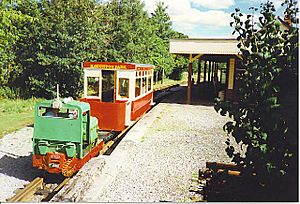Alford Valley Railway facts for kids
Quick facts for kids Alford Valley Railway |
|
|---|---|

Alford Railway Station
|
|
| Locale | Howe of Alford, Aberdeenshire, Scotland |
| Terminus | Alford Railway Station |
| Commercial operations | |
| Built by | Duncan MacKenzie Haggis Railway Services |
| Original gauge | 4 ft 8 1⁄2 in (1,435 mm) standard gauge |
| Preserved operations | |
| Preserved gauge | 2 ft (610 mm) |
| Commercial history | |
| 1859 | opened |
| Closed to passengers | 1950 |
| Closed | 1966 |
| Preservation history | |
| 1980 | Haughton Park to Murray Park opened |
| 1984 | Alford to Haughton Park opened |
| 2017 | railway closed |
| 2023 | Community Railway reopened |
The Alford Valley Railway is a fun, small railway in the beautiful Howe of Alford, Aberdeenshire, Scotland. It uses a special narrow track, which is only 2 ft (610 mm) wide! This railway is located where an older, bigger railway used to end. That original railway connected Alford to the main train lines at Kintore.
Contents
The First Alford Railway
Building the first Alford Valley Railway began in 1856. The line officially opened in 1859. It was a branch line of the Great North of Scotland Railway (GNSR).
Journey and Stops
The railway started from Kintore railway station, which is northwest of Aberdeen. It had several stations along the way. These included Kemnay, Monymusk, Tillyfourie, Whitehouse, and Alford.
What the Railway Carried
Besides passengers, the railway was very important for carrying goods. It served Kemnay Quarry and three other granite quarries nearby. Granite is a very hard stone used for building.
Building the Line
The highest point of the railway was near Tillyfourie, at about 618 feet (188 m) high. Here, workers had to dig a cutting through very hard granite. This cutting was about a mile long and 30 feet (9.1 m) deep. The train journey of 16-mile (26 km) usually took just over an hour.
Train Fares
Until 1883, there was a special rule about train tickets. By law, the cheapest ticket for one train a day could not cost more than a penny for each mile traveled. This made travel affordable for many people.
Changes Over Time
In 1923, the GNSR became part of a bigger company called the London and North Eastern Railway. Then, in 1948, it joined the Scottish Region of British Railways.
End of Service
The railway stopped carrying passengers on December 31, 1949. Mr. James Tocher was the driver of the very last passenger train into Alford Station. The goods service continued for a few more years. It closed exactly sixteen years later, on December 31, 1965. Mr. Robert Asher drove the final goods train.
The Narrow Gauge Railway Today
This smaller, narrow gauge railway was built using parts from an old peat moss railway in New Pitsligo. It was first suggested in 1979 and opened in 1980.
Early Routes
When it first opened, the railway ran for about 3 kilometres (1.9 mi) through Murray Park Woods from Haughton Park station. In 1984, a new line was added. This line went from Alford station, next to Alford Golf Course, to Haughton Park. This section was about 1.35 kilometres (0.84 mi) long. After this, the original Murray Woods line was closed.
The Station and Museum
The current station building stands where the original granite station used to be. That old building was taken down after British Rail closed the line. However, the platform where passengers wait is the original one! Inside the station building, there is a small railway museum. It tells the story of the railway.
Nearby Attractions
The original building where locomotives were kept was to the east of the station, but it has also been removed. To the west of the station, the old granite carriage shed from the first railway is now used by the Alford Valley Railway. You can also visit the Grampian Transport Museum and Alford Heritage Museum nearby.
Reopening the Railway
The railway closed in 2017. However, a new group called the Alford Valley Community Railway was formed. They worked hard to reopen the line. After being closed for six years, the Alford Valley Community Railway welcomed passengers again in August 2023.
 | Frances Mary Albrier |
 | Whitney Young |
 | Muhammad Ali |

